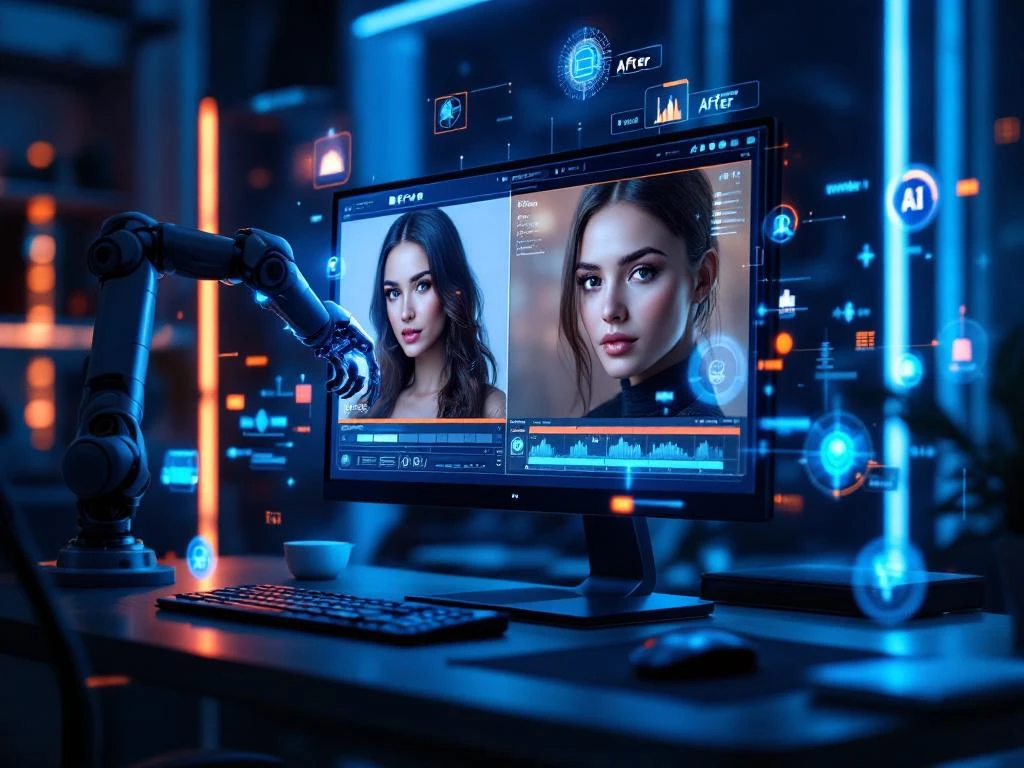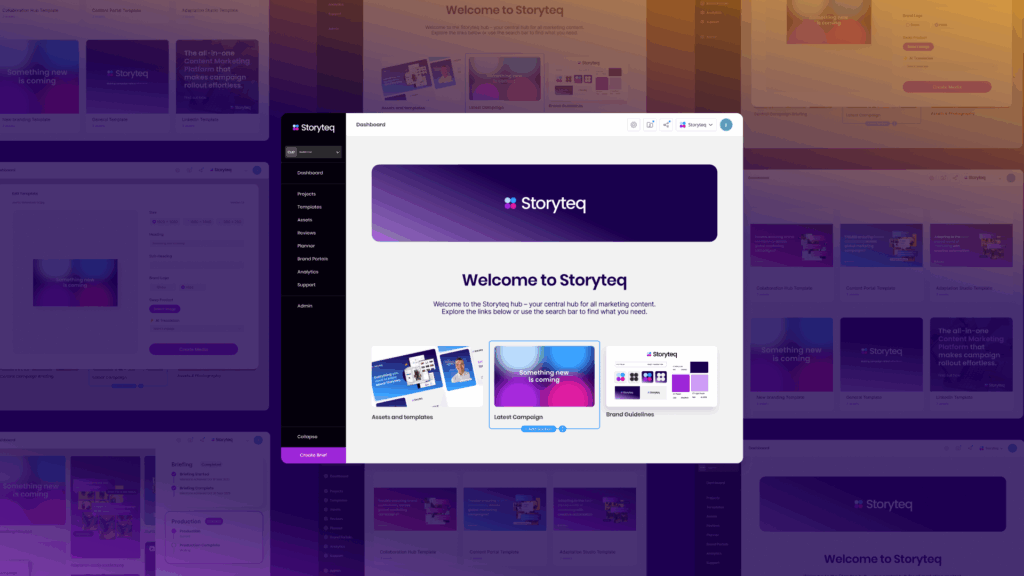AI content creation for marketing teams works by leveraging artificial intelligence algorithms to generate, optimise, and personalise marketing content at scale. The technology analyses data patterns, learns from brand guidelines, and automates repetitive creative tasks while allowing marketers to maintain strategic control. Modern AI content systems can generate everything from ad variations and social media posts to product descriptions and email campaigns, enabling marketing teams to produce more personalised content faster while maintaining brand consistency across channels.
How does AI transform the content creation process?
AI fundamentally transforms content creation by automating repetitive tasks while enhancing human creativity. Traditional content workflows often involve designers manually creating dozens or hundreds of variations of the same asset—a process that’s time-consuming and resource-intensive. AI content creation tools dramatically accelerate this process by allowing marketers to create dynamic templates that can automatically generate unlimited variations.
The transformation happens at multiple levels:
- Workflow automation: AI eliminates repetitive design tasks by allowing teams to create once and adapt infinitely
- Data-driven optimisation: AI analyses performance metrics to identify which content elements resonate best with specific audiences
- Mass personalisation: Content can be automatically tailored for different demographics, regions, or customer segments
- Brand consistency: AI ensures all content adheres to brand guidelines regardless of volume or variation
Rather than replacing creative professionals, AI empowers them to focus on high-value creative concepting while the technology handles execution at scale. This shift enables marketing teams to respond to market opportunities more quickly and deliver more relevant content to their audiences.
What can marketing teams automate with AI content systems?
Marketing teams can automate a wide range of content elements using AI systems, creating efficiency gains across multiple channels and formats. The most immediately impactful applications include:
- Dynamic ad variations: Automatically generate hundreds of ad sizes, formats, and messaging combinations from a single template
- Product descriptions: Create unique, SEO-optimised descriptions at scale based on product attributes
- Social media content: Generate platform-specific posts with optimised copy, imagery, and hashtags
- Email campaign personalisation: Tailor email content based on recipient data and behaviour
- Video personalisation: Create customised video content with dynamic elements like text, images, or offers
- Localisation: Adapt campaign assets for different markets, languages, and cultural contexts
By automating these elements, marketing teams can redirect valuable creative resources away from repetitive production tasks and toward strategic creative work. This automation is particularly valuable for global brands that need to maintain consistency while adapting content for different markets and channels.
The key benefit is that automated marketing content creation doesn’t just produce more assets—it produces more relevant assets that can be optimised based on performance data.
How do brands maintain creative control with AI content creation?
Brands maintain creative control with AI content creation through carefully designed guardrail systems that balance automation with human oversight. The misconception that AI content creation means surrendering creative control is outdated—modern systems are designed specifically to enforce brand standards while enabling scale.
Effective creative control in AI systems relies on:
- Template-based approaches: Creative teams design master templates that lock down brand elements while defining which aspects can be dynamically changed
- Brand asset management: Centralised libraries ensure only approved assets, fonts, colours, and messaging are available to the AI system
- Approval workflows: Automated review processes that require human sign-off at critical stages
- Permission-based access: Granular controls over who can modify templates, create content, or approve assets
The most successful implementations treat AI as a collaborative partner rather than a replacement for human creativity. Creative teams establish the parameters and approve the master templates, while AI handles the execution of variations within those established guidelines.
This approach ensures that even when producing thousands of content variations, every asset remains authentically on-brand while still allowing for the personalisation that drives personalized content at scale and improved campaign performance.
What’s the learning curve for implementing AI in marketing workflows?
The learning curve for implementing AI in marketing workflows varies based on team structure and existing processes, but is generally less steep than many organisations anticipate. Most marketing teams can achieve basic proficiency within 2-4 weeks, with more sophisticated implementation unfolding over 3-6 months.
Key factors affecting implementation include:
- Existing digital maturity: Teams already comfortable with template-based design and data-driven marketing typically adapt more quickly
- Integration requirements: How seamlessly the AI tools connect with existing marketing technology stacks
- Organisational alignment: Whether teams are structured to leverage the efficiencies AI provides
- Training approach: Staged implementation with proper training accelerates adoption
The most successful implementations begin with clearly defined use cases rather than attempting to transform all workflows simultaneously. For example, starting with display ad production before expanding to video or email content allows teams to build confidence and competence gradually.
It’s worth noting that the greatest challenge is often cultural rather than technical—helping teams understand that creative automation enhances rather than threatens their creative contributions. Teams that approach implementation with a focus on how AI can eliminate tedious tasks while expanding creative possibilities typically see faster adoption and better results.
How does AI content creation impact marketing campaign results?
AI content creation directly impacts marketing campaign results by enabling more testing, personalisation, and optimisation—all of which drive improved performance metrics. The impact is typically visible across multiple performance indicators:
- Engagement metrics: Personalised content consistently drives higher click-through rates and time-on-page
- Conversion improvements: Tailored messaging and offers typically increase conversion rates by 10-30%
- Campaign efficiency: Reduced production costs and time-to-market improve overall ROI
- Testing capacity: The ability to create and test more variations leads to faster performance optimisation
One of the most significant advantages is the ability to run true multivariate testing at scale. Rather than testing a handful of creative variations, teams can test dozens or hundreds of combinations to identify which elements drive the best performance for different audience segments.
This data-driven approach means marketing decisions are increasingly based on actual performance rather than assumptions or limited testing. Over time, the cumulative effect of these optimisations creates a substantial competitive advantage for brands that effectively leverage marketing AI solutions in their content creation processes.
At Storyteq, we’ve seen how AI-powered creative automation helps marketing teams close the execution gap between their creative ambitions and production realities. Our platforms enable brands to produce personalised, on-brand content at scale—helping them connect with audiences more effectively while freeing creative teams to focus on strategic innovation. If you’re interested in exploring how AI content creation could transform your marketing workflows, we’d be happy to show you how our solutions work in practice.



